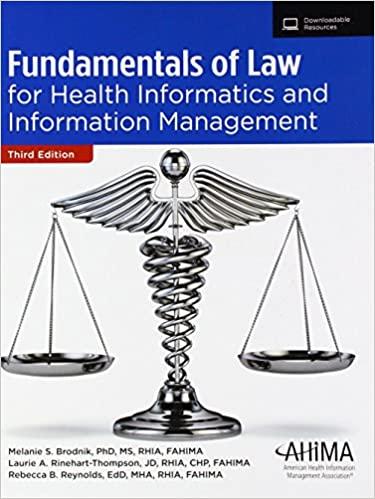Question
You can probably start the clock running, pardon the pun, with the SCOTUS decision in Sheppard v Maxwell . As you may know, the TV
You can probably start the clock running, pardon the pun, with the SCOTUS decision inSheppard v Maxwell. As you may know, the TV and film character "The Fugitive" was based on Dr. Sam Sheppard. The legacy and contemporary notions of "pretrial publicity" and "media circus" -- began in some way with this man and his murdered wife. One of his attorneys was on the OJ Simpson "Dream Team," by the way.Please note that there is a difference between the colloquial "cameras in the courtroom" and specific private media outlets/reporters in the courtroom, just as there's a difference between me recording a face-to-face class myself for UMGC, and you all doing so with cameras and/or phones, then Tweeting/posting about it later.
Here, you get the firstmoderntaste of this notion that the media can "prejudice" the atmosphere and thus affect the Constitutional rights of an accused to a fair trial under the Sixth Amendment, and due process under the Fifth. This means positive as well as negative publicity--saturation tends to cut against weighing evidence analytically and without retreat to your basic passions. That's the legal definition of "prejudice," though not the everyday one. In other words, its almost analogous to the word "distraction." Media loves distraction. Lady Justice, with her blindfold and scales, does not.Even when it's "good" for the defendant. Indeed, the TV show The Fugitive debuted as the Sheppard case ebbed and flowed, and adopted Dr. Sheppard's contention that a third party--which turned into the "one armed man"--committed the murder. Thus,you cannot say "hey it's ok because things balance," when there'shelpfuldistraction for the defendant, he or she is a local hero or cool celeb, andunhelpfulin the form of attacks & "outrage" in the media, and an abundance of reporters, etc. both pretrial and during the trial. Watching out for the mere potential of prejudice is what Sheppard gave us.
Respond to the following three scenarios:
1. Discuss whether being a public figure, wealthy/notorious helps re: pretrial publicity or hurts. Is there something about "national" versus "local" publicity and outrage? A court can always change venue, but does that necessarily help--look at the first Rodney King police verdict and the mayhem it caused... yet is protest and rioting a legitimate reason to change venue, etc.? How did that play out in the Boston Marathon bomber trial (surviving Tsarnaev brothers, convergence of legacy TV, social media and web, what's local is national and what's national is local).
2. Discuss what remedies are available if, in a criminal case, what if lawyers go on media outlets and in essence argue the case, misinform the public, thus poison the potential jury pool or actual impaneled jurors, and engage in PR? Maligning the victim, maligning potential witnesses or law enforcement? What is"gag order?" Media outlets have sued over gag orders with varying degrees of success. Why do defense lawyers have more leeway? What's the relevancy ofNebraska Press v Stuart?
(FYI: Media outlets can approach gran jurors and "petit" jurors [regular trial jurors] and get access to their names one the proceeding is done; likewise, the jurors themselves can do and say what they want. of course if its defamatory, breaks copyright, etc etc they might be in trouble, and they themselves are fair game if they start talking, and thus dip their toes into the public figure pool. Unless of course there are other items to be balanced. Courts have successfully restricted access to gran and petit jurors in Mafia and terrorist trials; likewise, the jurors themselves have voluntarily remained quiet and refused to comment after the proceedings are done.)
3. DiscussVirginia Pilot, Richmond NewspapersandGlobe, Press-Enterprise I, IIcases. Why have courts been so willing to give the news media more access to even pretrial proceeding and sensitive proceedings (juveniles, child abuse, rape, terrorist, organized crime)? What about witness lists, crime scene photos, evidence? Can a court preclude access to those automatically?
Step by Step Solution
There are 3 Steps involved in it
Step: 1

Get Instant Access to Expert-Tailored Solutions
See step-by-step solutions with expert insights and AI powered tools for academic success
Step: 2

Step: 3

Ace Your Homework with AI
Get the answers you need in no time with our AI-driven, step-by-step assistance
Get Started


